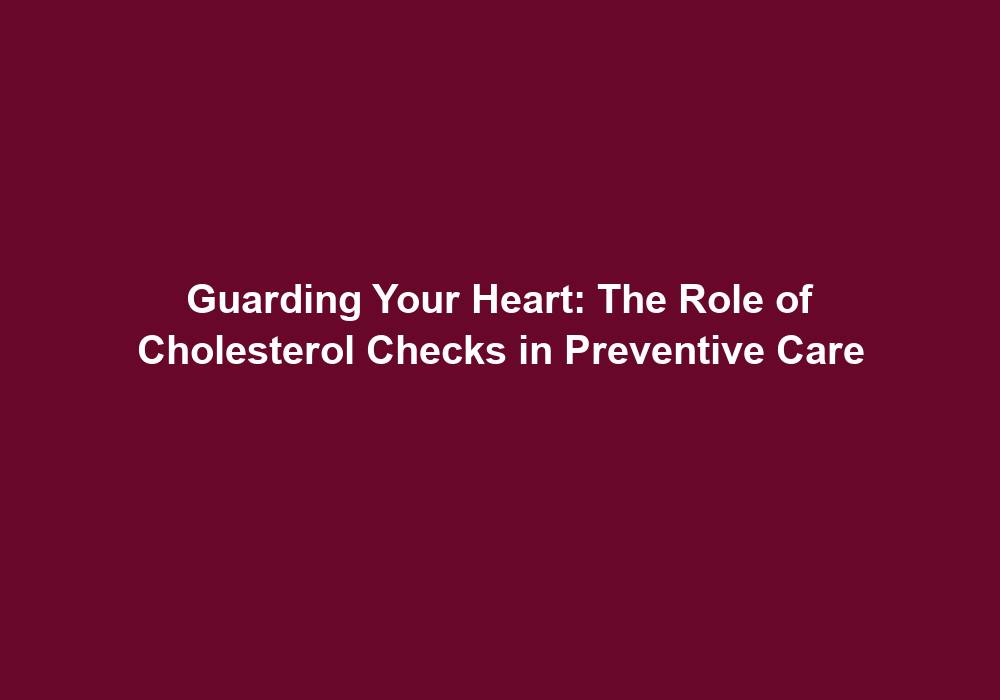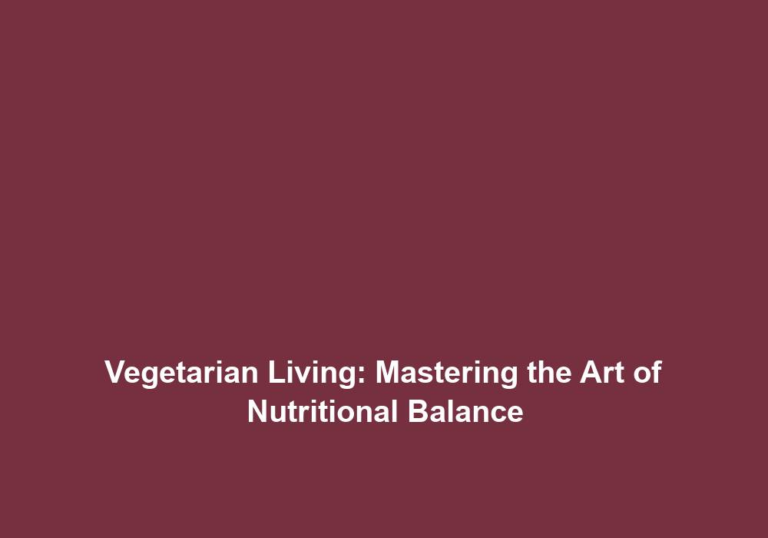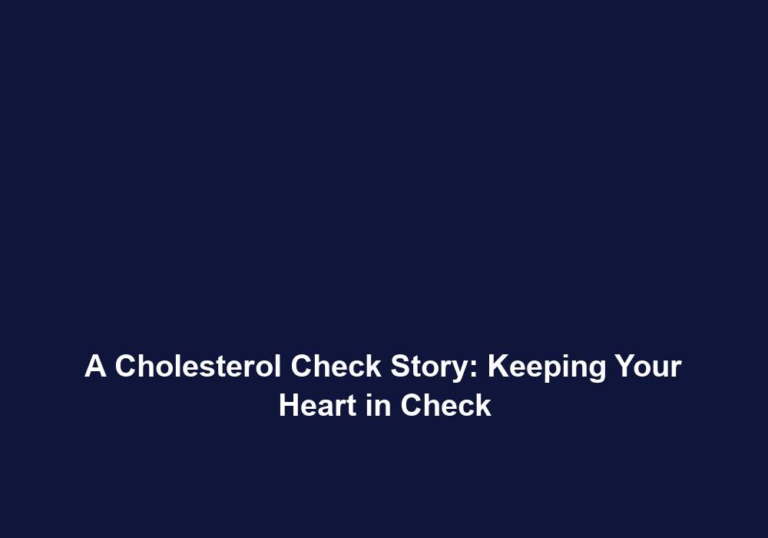Guarding Your Heart: The Role of Cholesterol Checks in Preventive Care
Cholesterol checks play a vital role in preventive care as they provide crucial insights into your heart health. By understanding your cholesterol levels, you can take proactive steps to protect your heart and overall well-being. This article will delve into the significance of cholesterol checks, explaining what cholesterol is, why it matters, and how you can maintain healthy cholesterol levels.
Understanding Cholesterol
Cholesterol is a waxy, fat-like substance that your body needs to function properly. It plays a critical role in the production of hormones, vitamin D, and bile acids that aid in digestion. While cholesterol is produced naturally by your liver, it is also found in certain foods. It is transported in the bloodstream through lipoproteins, which are categorized as low-density lipoproteins (LDL) and high-density lipoproteins (HDL).
LDL Cholesterol: The Bad Cholesterol
LDL cholesterol, often referred to as the bad cholesterol, is a major concern as high levels can lead to the buildup of plaque in your arteries. This buildup increases the risk of heart disease and stroke. When LDL cholesterol oxidizes, it triggers inflammation and damages the inner walls of blood vessels, initiating the formation of plaque. To protect your heart, it is crucial to keep LDL cholesterol levels within a healthy range.
HDL Cholesterol: The Good Cholesterol
In contrast to LDL cholesterol, HDL cholesterol is often called the good cholesterol. HDL carries cholesterol away from the arteries and back to the liver, where it is processed and eliminated from the body. High levels of HDL cholesterol are associated with a lower risk of heart disease, as HDL acts as a protector against the buildup of plaque.
The Importance of Cholesterol Checks
Regular cholesterol checks are essential to assess your heart health and identify any potential risks. By knowing your cholesterol levels, you can take appropriate measures to manage them effectively. Cholesterol checks provide valuable information, enabling healthcare professionals to develop personalized prevention or treatment plans tailored to your specific needs.
Cholesterol checks help you:
-
Monitor Your Heart Health: Cholesterol checks allow you to track changes in your cholesterol levels over time, helping you understand how your lifestyle and treatment choices impact your heart health.
-
Identify Risk Factors: High cholesterol levels can indicate an increased risk of heart disease. Regular checks can help identify these risk factors early, allowing you to take proactive steps to lower your cholesterol and reduce the likelihood of heart-related complications.
-
Evaluate Treatment Effectiveness: If you are already undergoing treatment for high cholesterol, regular checks can help evaluate the effectiveness of your current treatment plan. Adjustments can be made if necessary to ensure you are receiving optimal care.
-
Develop Preventive Strategies: Cholesterol checks provide healthcare professionals with valuable insights that enable them to develop personalized prevention strategies. By understanding your cholesterol levels and overall heart health, you can work together with your healthcare provider to create a comprehensive plan to protect your heart.
Optimal Cholesterol Levels
To maintain optimal heart health, it is important to aim for specific cholesterol levels. Here are the recommended ranges:
- Total Cholesterol: Less than 200 milligrams per deciliter (mg/dL)
- LDL Cholesterol: Less than 100 mg/dL (for individuals with a high risk of heart disease, less than 70 mg/dL is recommended)
- HDL Cholesterol: 60 mg/dL or higher
- Triglycerides: Less than 150 mg/dL
These ranges serve as guidelines to help you understand where your cholesterol levels should ideally be. However, it is essential to consult with your healthcare provider for personalized guidance and recommendations based on your individual health profile.
Achieving Healthy Cholesterol Levels
Fortunately, there are several lifestyle modifications you can adopt to promote healthy cholesterol levels:
1. Balanced Diet
Eating a heart-healthy diet can significantly impact your cholesterol levels. Focus on consuming foods that are low in saturated and trans fats, such as fruits, vegetables, whole grains, lean proteins, and healthy fats like avocados and nuts. Minimize your intake of processed foods, sugary drinks, and foods high in cholesterol.
A heart-healthy diet should include:
- Fruits and Vegetables: These are rich in fiber, antioxidants, and other nutrients that can help lower LDL cholesterol levels.
- Whole Grains: Whole grains like oats, brown rice, and whole wheat bread are high in fiber and can help reduce LDL cholesterol.
- Lean Proteins: Opt for lean protein sources like skinless poultry, fish, beans, and legumes instead of red meat.
- Healthy Fats: Include sources of healthy fats in your diet, such as avocados, nuts, seeds, and olive oil. These can help increase HDL cholesterol levels.
- Limit Saturated and Trans Fats: Minimize your intake of foods high in saturated and trans fats, such as fatty meats, full-fat dairy products, and processed snacks.
2. Regular Exercise
Engaging in regular physical activity can increase your HDL cholesterol levels while reducing LDL cholesterol. Aim for at least 150 minutes of moderate-intensity aerobic exercise or 75 minutes of vigorous exercise per week. Incorporate activities you enjoy, such as walking, swimming, cycling, or dancing.
Exercise helps in multiple ways:
- Weight Management: Regular exercise can help you maintain a healthy weight or lose excess weight, which can positively impact your cholesterol profile.
- Improved Blood Circulation: Physical activity improves blood flow, reducing the risk of plaque buildup in your arteries.
- Boosts HDL Cholesterol: Aerobic exercises like jogging, swimming, or cycling can increase HDL cholesterol levels, which is beneficial for heart health.
- Lowers LDL Cholesterol: Exercise helps lower LDL cholesterol levels, reducing the risk of plaque formation.
3. Maintain a Healthy Weight
Excess weight, especially around the waist, can raise LDL cholesterol levels. By maintaining a healthy weight, you can reduce the strain on your heart and improve your cholesterol profile. Combine a nutritious diet with regular exercise to achieve your weight goals.
Tips for maintaining a healthy weight:
- Portion Control: Be mindful of your portion sizes to avoid overeating.
- Eat Mindfully: Eat slowly and pay attention to your body’s hunger and fullness cues.
- Stay Hydrated: Drink plenty of water throughout the day to stay hydrated and help control your appetite.
- Manage Stress: Find healthy ways to manage stress, such as practicing mindfulness, engaging in hobbies, or seeking support from loved ones.
4. Avoid Smoking and Limit Alcohol Consumption
Smoking damages blood vessels and lowers HDL cholesterol levels. Quitting smoking can improve your cholesterol levels and overall cardiovascular health. Additionally, excessive alcohol consumption can raise triglyceride levels and contribute to high blood pressure. If you drink alcohol, do so in moderation.
Quit smoking and limit alcohol intake by:
- Seeking Support: Reach out to healthcare professionals, support groups, or counseling services to help you quit smoking.
- Find Healthy Alternatives: Engage in activities that distract you from smoking, such as exercise, hobbies, or spending time with loved ones.
- Set Limits: If you choose to drink alcohol, set limits and stick to them. For men, moderate drinking is defined as up to two drinks per day, and for women, it is up to one drink per day.
5. Medication and Supplements
In some cases, lifestyle changes alone may not be sufficient to control cholesterol levels. Your healthcare provider may prescribe medications, such as statins, to help manage your cholesterol. Additionally, certain supplements, like omega-3 fatty acids, may have a positive impact on cholesterol levels. Always consult with your healthcare professional before starting any medication or supplement regimen.
Some commonly prescribed medications for high cholesterol include:
- Statins: These medications help lower LDL cholesterol levels and reduce the risk of heart disease.
- Bile Acid Resins: These drugs work by binding to bile acids, reducing the reabsorption of cholesterol and lowering LDL cholesterol.
- Ezetimibe: This medication blocks the absorption of cholesterol in the intestine, reducing LDL cholesterol levels.
- Fibrates: Fibrates can lower triglyceride levels and increase HDL cholesterol levels.
Remember, medications and supplements should be used under the guidance of a healthcare professional who will consider your overall health and individual needs.
Final Thoughts
Guarding your heart health is of utmost importance, and cholesterol checks are a crucial aspect of preventive care. By understanding your cholesterol levels and making necessary lifestyle modifications, you can reduce your risk of heart disease and maintain overall well-being. Prioritize regular cholesterol checks and work closely with your healthcare provider to develop a comprehensive plan to protect your heart and lead a healthy life.
Please note that the content provided here is for informational purposes only and should not replace professional medical advice. Always consult with a qualified healthcare professional for personalized guidance and recommendations regarding your cholesterol levels and overall health.







